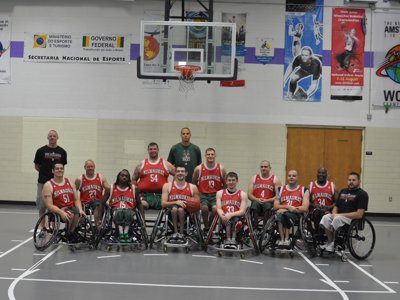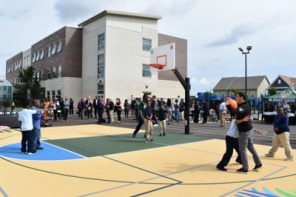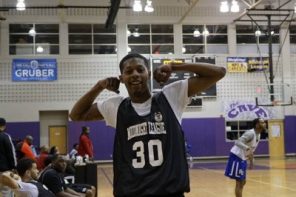It’s been a rough year for basketball fans in Milwaukee. After spending and seemingly setting their preseason sights yet again on the seventh playoff seed, the Bucks have struggled to win enough games to upgrade from abysmal to merely bad.
Meanwhile, Marquette is in the midst of one of their worst years under Buzz Williams – with a late run for a strong Big East Tournament showing likely needed to keep their NCAA Tournament dreams curdling into a NIT reality – and UWM’s strong start melted away soon after conference play started.
However, there is one basketball team that’s doing the city proud – and in fact has been for well over a decade now: the Milwaukee Wheelchair Bucks. They’ll be showing off their skills in a tournament – or, to be more exact, a collection of league games – this weekend at Whitnall High School in Greenfield.
The team started about 14 years ago when Steve Wilson, the Wheelchair Bucks’ coach, met many of the current players while he was studying at UW-Whitewater, which has one of the top wheelchair basketball programs in the nation.
“After I got to meet some of the players, they asked if I wanted to come and help out at a camp for kids with disabilities called Junior Outreach,” Wilson said. “I’m like, ‘Sure.’ Basically, it allowed the kids to be just like us, where they’d do anything everybody else would be doing, except they’d be with kids like them, so they got to learn and associate with one another.”
That experience opened the door for Wilson to help out with the Whitewater wheelchair basketball camps and the school’s team. He went on to coach the team and help run the program for several years before graduating and pursuing a career in teaching. However, he wasn’t done with wheelchair basketball. Soon after leaving Whitewater, he and the players he met at the school decided to form the Milwaukee Wheelchair Bucks.
Since its creation, the Bucks – who feature 11 Wisconsin residents and are sponsored by the NBA team that shares their name – have become a force to be reckoned with. In their first season in the 20-team Championship Division of the National Wheelchair Basketball Association (NWBA), the Bucks went undefeated and won the championship. They’ve been mostly able to maintain that quality over time as well, finishing in third place last year and currently ranked number two in the standings behind the Dallas Wheelchair Mavericks.
It’s an impressive feat made even more so by often having to restock players after many leave for the significantly bigger overseas wheelchair basketball market.
“One of the guys I know who was on the USA team gets paid $100,000 a year to play wheelchair basketball overseas,” Wilson said. “And for every game, there’s thousands of people in the stands. He plays for Turkey, but there’s teams all over Germany and all over Europe.”
Wilson and the Wheelchair Bucks hope to create a taste of that kind of fandom locally this weekend with their four-team event at Whitnall High School. Starting Friday and going into Saturday, the Bucks will be facing off against the RIC Hornets, the Grand Rapids Pacers and the third ranked New York Rollin Knicks, their toughest competition in the round-robin tournament.
“They have two Canadian Paralympic players that have won three Paralympic gold medals,” Wilson said. “One of the guys on their team is probably one of the best wheelchair basketball players in the world, Pat Anderson. He’s unbelievable.”
For Wilson, a physical education teacher at Whitnall Middle School, one of the goals for bringing these wheelchair basketball games to town is to show his students real-life professional players in action.
“We teach wheelchair basketball at the school,” Wilson said. “Every year, I borrow chairs from all of the people I know and teach a disability awareness unit. The kids know about it and have been involved with it, but to see the extra entity of where the athletes can go. To see those players compete, I think, solidifies where they’re going and what they’ve done.”
Another goal of bringing the tournament to town is destroying some of the misconceptions that people may have about wheelchair basketball. Everything is pretty much the same from stand-up basketball, such as the court, three-point line and free throw line. They play 20-minute halves much like college basketball, and the games are still fairly high-scoring, with the Wheelchair Bucks averaging about 70 points a game (they almost scored 100 earlier in the season but stalled out at 99).
There are a few rule changes. Dribbing in wheelchair basketball means a player has to dribble once for every two pushes with the chair. Then there’s the concept of “backpicking,” which Wilson describes as pressing but for the offense. The spacing of the players on the court is also a different animal for wheelchair basketball. However, the speed and athleticism of the sport still remains.
“I don’t think it’s as much now, but some people may think it’s not competitive, it’s not fast-paced, or not exciting to watch,” Wilson said. “When we do the wheelchair basketball demos at the school, the kids are just in love with it. But before that, I don’t think they realize what it’s all about. It’s a great sport that anybody can do and anybody can fall in love with.”
“I think people picture ten guys on a basketball court in big hospital wheelchairs moving around really slow,” said Nate Hinze, a low-post player for the Milwaukee Wheelchair Bucks. “I don’t think they realize the fast pace, the speed and the contact.”
In 2005, Hinze – a multi-sport athlete in high school – was diagnosed with a type of bone cancer called osteosarcoma. The disease ended up requiring nine months of chemotherapy and a surgery that replaced his leg with a titanium rod and artificial knee. He can still walk with a limp, but his range of movements is limited. He can’t run, jump or walk long distances.
Hinze, however, wasn’t phased. A year later, in 2006, he started playing wheelchair basketball at UW-Whitewater.
“In the beginning, it was super difficult, and you get really frustrated,” Hinze said. “Now, the chair is just a part of your body. You learn different tricks and maneuvers that can get you going and stuff like that. After a while, you just get used to it, and the chair is a part of your life. It’s not that bad.”
After graduating from Whitewater, Hinze went on to join the Wheelchair Bucks, where he’s thrived as a low-post player. Despite having memories of playing stand-up basketball and other sports, he doesn’t particularly miss them.
“I know that, if I were playing able-bodied basketball, I wouldn’t be doing the things I’m doing today,” Hinze said. “I don’t ever really regret it. I don’t really think about it a whole lot. I can look back on my experiences and take pride in what I’m doing right now.”
And Hinze certainly has plenty to be proud of. He’s been on the USA wheelchair basketball team since 2009, traveling and competing all across the globe, including the Paralympics in London in 2012. It was an experience that Hinze “still struggles to describe.” He’s met incredible people as well, both across the globe and right here at home with his team.
“They’re not just your teammates anymore,” Hinze said. “They kind of turn into your best friends and your brothers. And when you go out and play for the Bucks, it’s almost like a class reunion every weekend.”
The Bucks’ wheelchair basketball tournament begins Friday, Jan. 31 with one game at 7 p.m at Whitnall High School. The tournament resumes Saturday, Feb. 1 at 8:30 a.m. with a new game starting every two hours throughout the day. Admission is $2 for adults, $1 for students and free for children ages 6 and under. To donate to the Milwaukee Wheelchair Bucks, visit their funding website.


 i evaluate to yes even if there's no image
i evaluate to yes even if there's no image  i evaluate to yes even if there's no image
i evaluate to yes even if there's no image  i evaluate to yes even if there's no image
i evaluate to yes even if there's no image  i evaluate to yes even if there's no image
i evaluate to yes even if there's no image  i evaluate to yes even if there's no image
i evaluate to yes even if there's no image  i evaluate to yes even if there's no image
i evaluate to yes even if there's no image 